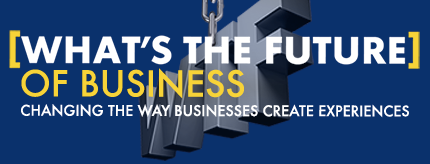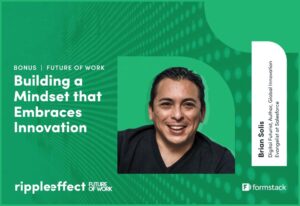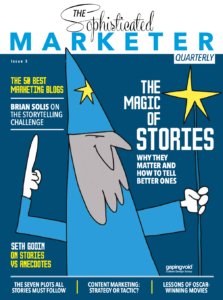The biggest challenge is not in the understanding or expertise associated with new technology. We can learn that. The biggest problem is our inability to recognize that the experience we have today is not the experience we need going forward.
A notable separation exists between the expertise people have or are learning and the jobs companies need to hire for in an increasingly digital economy. This means that current employees possess expertise to perform jobs that are losing prominence in business while new jobs openings (or the need to create them) are becoming increasingly difficult to fill.
This is a problem to say the least. The question is, why isn’t there a greater sense of urgency around this looming threat? Perhaps it’s because this dilemma affects more than HR, it affects the entire business down to its fiefdoms, silos, job security, and everyday politics.
LinkedIn CEO Jeff Weiner recently observed, “There is a widening skills gap where the existing workforce has been educated and trained to obtain the jobs of yesterday and not the jobs of today and tomorrow.”
Jeff Weiner would know. He runs a company that houses one of the world’s most up-to-date indicators on the future of the job market. See, LinkedIn isn’t just a social network where professionals host digital resumes and connect with colleagues, prospects and partners. LinkedIn hosts millions of companies that actively list roles they need to fill as well as people who willingly share their experience and ambitions.
Believe it or not, experts debate whether or not the skills gap is actually a real thing. I guess it’s not unlike global warming. If we don’t see it then it must not exist right?
Last year though, 35% of 38,000 employers reported difficulty filling jobs due to lack of available talent; in the U.S., 39% of employers did according to an article in the Harvard Business Review by James Bessen, an economist at Boston University School of Law.
What’s at the heart of the problem?
So.many.things.
First, there is the reality that people are performing jobs that support yesterday’s business models and objectives. To compete for the future requires that leadership establish a tangible and long-term vision for the new world and assess strengths and weaknesses of its workforce to prioritize strategies and investments in human capital.
I once worked with a popular commercial and consumer insurance brand that celebrated a culture of never firing employees. While this created a unique family-like bond that once served as a competitive advantage, it is the company’s own culture that is now serving as its anchor. It just seems that there’s just no sense of urgency or meaningful incentive for individuals or teams to learn something new.
Second, there are a growing number of jobs where humans need not apply. Automation is nothing new nor is it bad. Automation though is inevitable. However, with digital intelligence and capabilities comes the need for people to learn the skills and capabilities that keep the human workforce performing the jobs that machines cannot do today.
We have been through economic revolutions before, but the robot revolution is different.
Horses aren’t unemployed now because they got lazy as a species, they’re unemployable. There’s little work a horse can do that do that pays for its housing and hay.
And many bright, perfectly capable humans will find themselves the new horse: unemployable through no fault of their own.
That’s one part of a multifaceted puzzle however.
Third, an incredible generation gap exists between Matures, Baby Boomers, Generation X and Millennials. In a sense, it’s three against one as Millennials are the first modern workforce to act and think as a collective differently enough to challenge business as usual simply by existing.
They’re the first to possess digital in their DNA whereas the others are inherently analog-first. How they approach work, how they work, how they work with others, is intrinsically different than that of their predecessors. It’s just who they are. Social, mobile, real-time, how they interact in the real world is not how they interact, or care to, in the workplace. Believe it or not, some of the technologies that support big business today was invented before the browser. And, the browser and the entire internet experience has been completely modified in a short while because of always-on mobile apps.
That’s just the beginning of understanding the impact of Millennials on the workforce. It is their aspirations, what they value and their vision for management and advancement that is challenging the very foundation of traditional work. It’s a problem that growing faster than many realize.
PwC, a global company that focuses on audit and assurance, tax and consulting services, published a report that revealed 80% of the workforce of the PwC firms will be Millennials by 2016. Eighty percent!
We’ve only reviewed a few of the sources causing the expertise gap and I’ve run out of words for this article. The time is now to counter this movement by thinking about what to do when large sections of the population are unemployable before it happens.
Sometimes, legacy holds us back for the sake of legacy not progression. There’s a quote I can’t help but think of when considering the existing expertise gap at work. As Viktor E. Frankl once wrote, “It isn’t the past which holds us back, it’s the future; and how we undermine it, today.”
This isn’t an HR issue. This is a problem and opportunity that rises all the way to the leadership organization requiring leaders to lead as the expertise gap cannot be solved with mere management tactics.
Training and education is one way to address this.
Support, nurturing and rewards will also help.
But nothing can begin without first accepting that a problem exists, understanding the extent of the problem, and putting into effect digital transformation strategies that close the gap now and also sets the stage to compete for the future.
Connect with me… Twitter | LinkedIn | Facebook | Youtube | Instagram | Pinterest







OMG..agree 100% Always great stuff Brian!
Thank you Jeffery!
Brian, you’ve got me thinking very seriously about the short and long term impacts of the issues you described in your post. Thanks for sharing and sparking some ideas … I’ll follow-up.
Thank you…
Really Very Good information posted by you. I agree !!!
As an aspiring small business owner (currently unprofitable) it’s kind of scary to think how difficult it might be to bring employees up to speed and to learn the system.